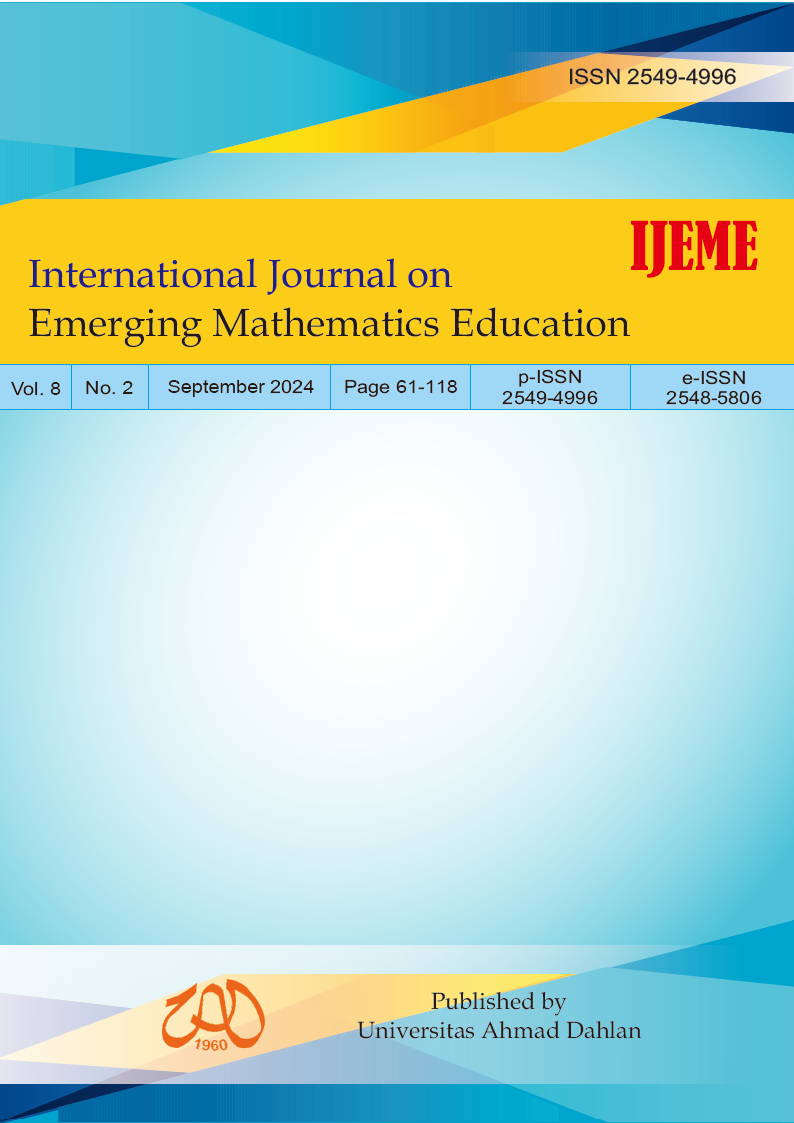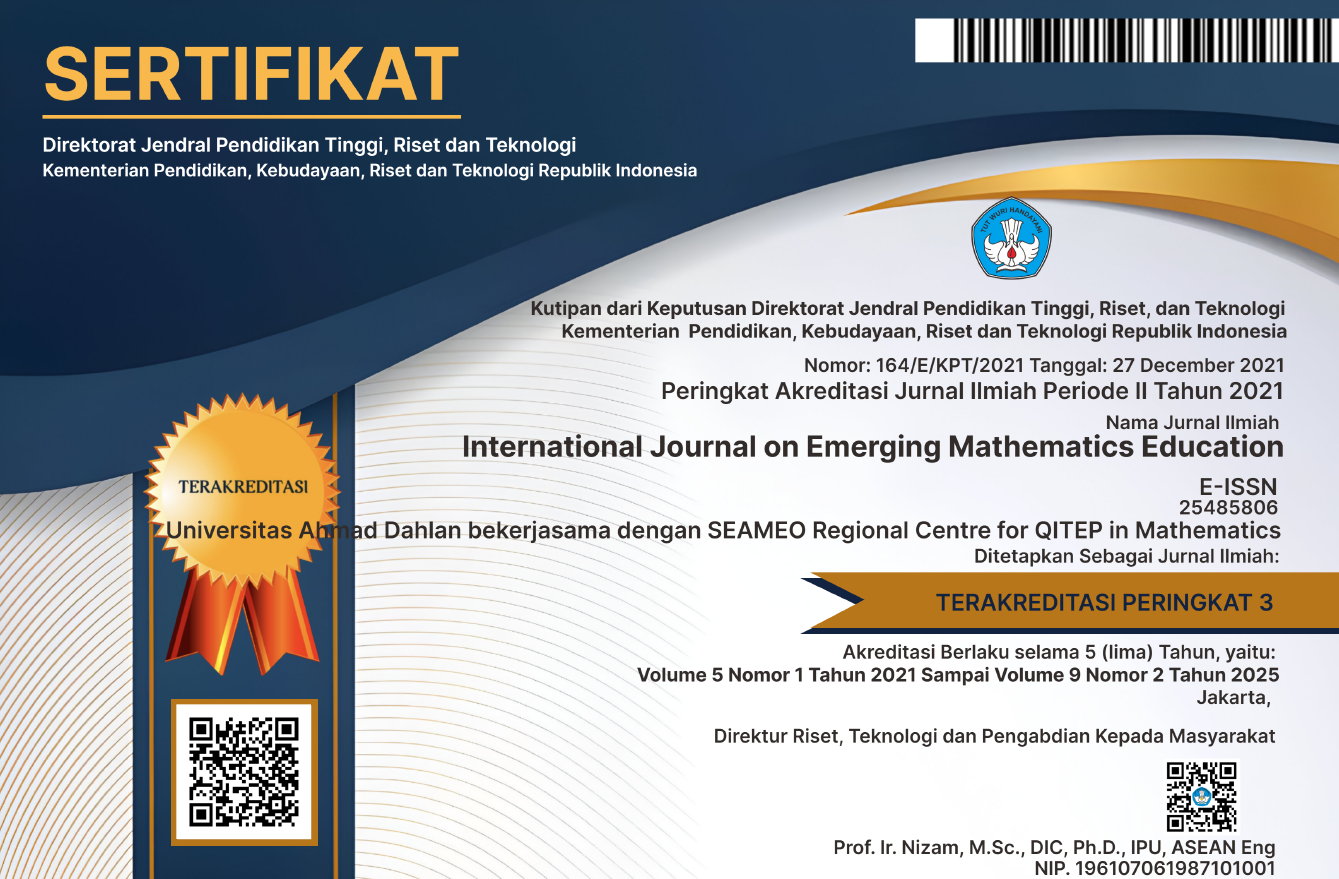Reciprocal Peer Tutoring Strategy on Students’ Anxiety, Self-Efficacy, and Mathematics Performance
DOI:
https://doi.org/10.12928/ijeme.v8i1.28393Keywords:
General Mathematics, K to 12 Curriculum, Senior High SchoolAbstract
The study aimed to investigate the effectiveness of Reciprocal Peer Tutoring (RPT) in reducing mathematics anxiety and improving self-efficacy to advance the mathematics performance of senior high school students in a General Mathematics course. The researcher employed the quasi-experimental design, specifically the Pretest 1, Pretest 2 – Posttest design. Two groups were randomly assigned: the conventional teaching strategy (CTS) group (control) and the reciprocal peer tutoring (RPT) group (experimental). The mathematics anxiety and self-efficacy were measured using an adapted instrument. Mathematics performance was measured using the General Mathematics Achievement Test (GMAT), a researcher-made test. The significant findings of the study reveal that the mathematics anxiety of the experimental group is significantly lower than that of the control group. Further, the prediction model indicated that mathematics anxiety significantly predicts mathematics performance. Unfortunately, it is found that RPT is not effective in improving self-efficacy. Several probable reasons were identified.
References
Ahmed, K., Trager, B., Rodwell, M.L., & Lopez, C. (2017). A review of mindfulness research related to alleviating math and science anxiety. Journal for Leadership and Instruction, 26-30.
Alegre, F., Moliner, L., Maroto, A., & Lorenzo-Valentin, G. (2020). Academic achievement and peer tutoring in mathematics: A comparison between primary and secondary education. SAGE Open, 1-9. http://doi: 10.1177/2158244020929295
Ashcraft, M.H., & Moore, A.M. (2009). Mathematics anxiety and the affective drop in performance. Journal of Psychoeducational Assessment, 27(3), 197-205. DOI: 10.1177/0734282908330580.
Ayotola, A. & Adegeji, T. (2009). The relationship between mathematics self-efficacy and achievement in mathematics. Procedia Social and Behavioral Sciences I, 953-957. doi: 10.1016/j.sbspro.2009.01.169.
Bandura, A. (1994). Self-efficacy. In V. S. Ramachaudran (Ed.), Encyclopedia of human behavior (Vol. 4, pp. 71-81). New York: Academic Press. (Reprinted in H. Friedman [Ed.], Encyclopedia of mental health. San Diego: Academic Press, 1998).
Beilock, S.L. & Maloney, E.A. (2015). Math anxiety: A factor in Math achievement not to be ignored. Policy Insights from the Behavioral and Brain Sciences. 2(1), 4-12. https://doi.org/10.1177/2372732215601438
Chowdhury, M.S. (2006). Human behavior in the context of training: An overview of the role of learning theories as applied to training and development. Journal of Knowledge Management Practice, 7(2), 94-101.
Das, S.K., Halder, U.K., & Bairagya, S. (2014). Math anxiety and math achievement in rural minority students. International Journal of Informative & Futuristic Research 2(8), 14-19.
De Backer, L., Van Keer, H., & Valcke, M. (2011). Exploring the potential impact of reciprocal peer tutoring on higher education students’ metacognitive knowledge and regulation. Springer Science + Business Media BV. DOI 10.1007/s11251-011-9195-5.
Freedman, E. (1997). Do you have math anxiety? A self-test. Retrieved from: http://www.mathpower.com/anxtest.htm
Gan, S., & Hong, K. (2010). The effectiveness of peer tutoring in the teaching of mathematics. Malaysian Journal of Learning and Instruction, 7, 113-132.
García-Santillán, A., Rojas-Kramer, C., Moreno-García, E., & Ramos-Hernández, J. (2017). Mathematics test, numerical task, and mathematics course as determinants of anxiety toward math on college students. European Journal of Contemporary Education, 6(2), 240-253. DOI: 10.13187/ejced.2017.2.240.
Gazula, S., McKenna, L., Cooper, S., & Paliadelis, P. (2017). Systematic review of reciprocal peer tutoring within tertiary health profession educational programs. Health Professions Education, 3, 64-78. http://dx.doi.org/10.1016/j.hpe.2016.12.001
Guita, G.B., & Tan, D.A. (2018). Mathematics anxiety and students’ academic achievement in a reciprocal learning environment. International Journal of English and Education, 7(3), 112-124.
Harari, R.R., Vukovic, R.K., & Bailey, S.P. (2013). Mathematics anxiety in young children: An exploratory study. The Journal of Experimental Education, 81(4), 538–555. DOI: 10.1080/00220973.2012.727888.
Henson, L., Hagos, L., & Villapando, R. (2009). The effectiveness of reciprocal peer tutoring (RPT) on the academic performance of students in mathematics. Proceedings of the 2nd International Conference of Teaching and Learning. INTI University College, Malaysia.
Justicia-Galiano, M.J., Martín-Puga, M.E., Linares, R., & Pelegrina, S. (2017). Math anxiety and math performance in children: the mediating roles of working memory and math self-concept. British Journal of Educational Psychology,87, 573-589.
Karimi, A., & Venkatesan, S. (2009). Mathematics anxiety, mathematics performance and academic hardiness in high school students. International Journal of Science Education, 1(1), 33-37. DOI: 10.1080/09751122.2009.11889973
Kiwanuka, H.N., Damme, J.V., Noortgate, W.V.D., Anumendem, D.N., & Namusisi, S. (2015). Factors affecting mathematics achievement of first-year secondary school students in Central Uganda. South African Journal of Education, 35(3), 1-16. DOI: 10.15700/SAJE.V35N3A1106
Launio, R. (2015). Instructional medium and its effect on students’ mathematics achievement. International Journal of Multidisciplinary and Current Research, 3, 462-465.
Maliki, A.E., Ngban, A.N., & Ibu, JE (2009). Analysis of students’ performance in junior secondary school mathematics examination in Bayelsa State of Nigeria. Studies on Home and Community Science, 3(2), 131-134.
May, D.K. (2009). Mathematics self-efficacy and anxiety questionnaire. Dissertation. Athens: University of Georgia
Meera, KP, & Jumana, MK (2016). Self-efficacy and academic performance in English. Original Scientific Paper, 25-30. DOI: 10.17810/2015.13.
Meier, K. (2015). Overcoming mathematics anxiety: how does teaching mathematics conceptually impact students learning math? Thesis. Ontario: University of Toronto. https://tspace.library.utoronto.ca/bitstream/1807/68713/1/Meier_Krista_R_201506_MT_MTRP.pdf
Mkpanang, J. (2016). Effects of class wide and reciprocal peer tutoring strategies on students’ mathematical problem-solving achievement in electricity concepts in physics. International Journal of Education, Learning and Development, 4(3), 37-44.
Moliner, L. & Alegre, F. (2020). Peer tutoring effects on students’ mathematics anxiety: a middle school experience. Front. Psychol. 11:1610. doi: 10.3389/fpsyg.2020.01610
Motlagh, S.E., Amrai, K., Yazdani, M.J., Abderahim, H., & Souri, H. (2011). The relationship between self-efficacy and academic achievement in high school students. Procedia Social and Behavioral Sciences, 15, 765–768. doi:10.1016/j.sbspro.2011.03.180
Mutodi, P., & Ngirande, H. (2014). Exploring mathematics anxiety: mathematics students’ experiences. Mediterranean Journal of Social Sciences, 5(1), 283-294. Doi:10.5901/mjss.2014.v5n1p283
Núñez-Peña, M. I., Suárez-Pellicioni, M., & Bono, R. (2013). Effects of math anxiety on student success in higher education. International Journal of Educational Research, 58, 36-43.
Organization for Economic Cooperation and Development (OECD) (2019). PISA 2018 results (volume I): What students know and can do. PISA. OECD Publishing, Paris. https://doi.org/10.1787/5f07c754-en.
Organization for Economic Cooperation and Development (OECD) (2022). PISA 2022 results (volume I): (Volume I): The State of Learning and Equity in Education. https://www.oecd-ilibrary.org/sites/53f23881en/index.html?itemId=/content/publication/53f23881-en
Riggio, R., Whatley, M., & Neale, P. (1994). Effects of student academic ability on cognitive gains using reciprocal peer tutoring. Journal of Social Behaviour and Personality: An Interdisciplinary Journal, 9(3), 529-542.
Savelsbergh, E. R., Prins, G. T., Rietbergen, C., Fechner, S., Vaessen, B. E., Draijer, J. M., & Bakker, A. (2016). Effects of innovative science and mathematics teaching on student attitudes and achievement: A meta-analytic study. Educational Research Review, 19, 158-172.
Taylor, E. (2014). The correlation between self-efficacy and the academic success of Students. Thesis. Lynchburg: Liberty University. Retrieved from: https://digitalcommons.liberty.edu/honors/474/
Uroko, J.E. (2010). Effects of reciprocal peer tutoring on achievement, interest and perceived self-efficacy in reading comprehension of senior secondary school students in Enugu State, Nigeria. Dissertation. Nsukka: University of Nigeria. Retrieved from: https://oer.unn.edu.ng/read/effects-of-reciprocal-peer-tutoring-on-achievement-interest-and-perceived-self-efficacy-in-reading-comprehension-of-senior-secondary-school-students-in-enugu-state-nigeria?rdr=1
Vakili, K. & Pourrazavy, Z.A. (2017). Comparing the math anxiety of secondary school female students in groups (Science and Mathematical Physics) public schools. International Journal of Environmental & Science Education, 12(4), 755-751.
Woodard, T. (2004). The effects of mathematics anxiety on post-secondary developmental students as related to achievement, gender and age. Inquiry, 9(1).
Zakaria, E., Zain, N.M., Ahmad, N.A. & Erlina, A. (2012). Mathematics anxiety and achievement among secondary school students. American Journal of Applied Sciences, 9(11), 1828-1832. doi:10.3844/ajassp.2012.1828.1832
Zhou, M., & Brown, D. (2015). Educational learning theories (2nd ed.). Education Open Textbooks. https://oer.galileo.usg.edu/education-textbooks/1/
Zimmerman, B.J. (2000). Self-Efficacy: An essential motive to learn. Contemporary Educational Psychology, 25, 82–91. doi:10.1006/ceps.1999.1016.
Downloads
Published
How to Cite
Issue
Section
License
Copyright (c) 2024 Alvin Albea Celedonio, Ronaldo S.P. Elicay

This work is licensed under a Creative Commons Attribution-ShareAlike 4.0 International License.
License and Copyright Agreement
In submitting the manuscript to the journal, the authors certify that:
- They are authorized by their co-authors to enter into these arrangements.
- The work described has not been formally published before, except in the form of an abstract or as part of a published lecture, review, thesis, or overlay journal. Please also carefully read the International Journal on Emerging Mathematics Education (IJEME) Author Guidelines at http://journal.uad.ac.id/index.php/IJEME/about/submissions#authorGuidelines
- That it is not under consideration for publication elsewhere,
- That its publication has been approved by all the author(s) and by the responsible authorities, tacitly or explicitly, of the institutes where the work has been carried out.
- They secure the right to reproduce any material that has already been published or copyrighted elsewhere.
- They agree to the following license and copyright agreement.
Copyright
Authors who publish with the International Journal on Emerging Mathematics Education (IJEME) agree to the following terms:
- Authors retain copyright and grant the journal the right of first publication with the work simultaneously licensed under a Creative Commons Attribution License (CC BY-SA 4.0) that allows others to share the work with an acknowledgment of the work's authorship and initial publication in this journal.
- Authors are able to enter into separate, additional contractual arrangements for the non-exclusive distribution of the journal's published version of the work (e.g., post it to an institutional repository or publish it in a book), with an acknowledgment of its initial publication in this journal.
- Authors are permitted and encouraged to post their work online (e.g., in institutional repositories or on their website) prior to and during the submission process, as it can lead to productive exchanges, as well as earlier and greater citation of published work.
![]()
Ciptaan disebarluaskan di bawah Lisensi Creative Commons Atribusi-BerbagiSerupa 4.0 Internasional.





